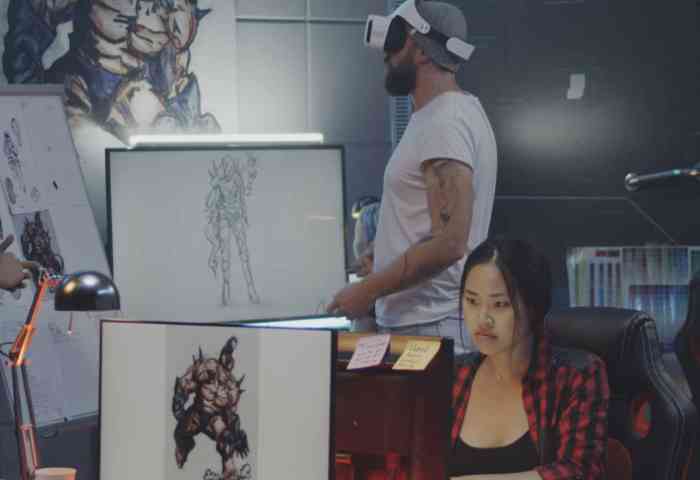Get started with Mizzou
ApplySince the 1960s, serious games have presented an engaging, immersive learning experience. Over the decades, the delivery method has evolved: beyond physical activities and controlled environments, game and simulation design presents the tools to craft a virtual, life-like learning experience. School-age children and adolescents absorb new concepts beyond textbooks and worksheets, and adults attend educational or occupational training to practice or build off what they know.
Mizzou's online Graduate Certificate in Serious Game and Simulation Design teaches you the skills to develop and pioneer transformational educational opportunities in your school, workplace or training facility.
This 16-credit online game design program program blends several different disciplines for a cross-categorical approach. You'll learn about all aspects of serious game design. Curriculum covers:
- Art.
- Design.
- Programming.
- User experience.
- Testing.
- Digital media.
- Content.
- Computer science.
- Software engineering.
These concepts help you overhaul existing educational efforts and design your own. Explore where narrative, objectives, graphics and experience appeal to and motivate your audience to complete tasks and absorb new information.
The online Graduate Certificate in Serious Game and Simulation Design is overseen by the School of Information Science and Learning Technologies (SISLT). SISLT is a proud member of the iSchools consortium, an international coalition of leading information schools.
Quick facts
Official name
Graduate Certificate in Serious Game and Simulation DesignCampus
Program type
Graduate certificateAcademic home
College of Education & Human Development | School of Information Science and Learning TechnologiesDelivery mode
100% onlineAccreditation
Higher Learning CommissionCredit hours
16Estimated cost
$9,438.40*This cost is for illustrative purposes only. Your hours and costs will differ, depending on your transfer hours, your course choices and your academic progress. See more about tuition and financial aid.
Why earn a certificate in serious game and simulation design?
Organizations and schools strive to engage learners of all ages. And serious games are among the most engaging educational experiences through hands-on application. This allows learners to try out and see theories in action. Through simulation, nearly any type of program or objective is possible. Serious games increasingly harness these technologies. They are developed to provide educational tasks for a variety of learners, like:
- K–12 and university students.
- Health care providers.
- Military personnel.
- Scientists.
- Engineers.
- Emergency managers.
- Marketers.
Serious games are also used for research and observational purposes.
What goes into serious game and simulation design? At its core, this discipline combines creative, digital and technology skills with storytelling. It also factors in psychology and sociology principles. Your creations captivate learners, providing feedback and entertainment while teaching new concepts.
Through Mizzou’s online game design program, existing educators and game developers can expand their skills. Using their newfound expertise, they can pivot careers or stand out in their existing role. Courses are constantly being refined to keep pace with emerging technologies. Newly developed courses hone in on instructional design techniques necessary for making an impact in virtual settings. At the same time, while courses are 100% online, you’ll also learn in an applied, hands-on environment.
This online graduate certificate:
- Introduces the collaborative process behind developing serious games and simulated learning environments.
- Covers the software, game engine tools and technology equipment for prototyping simulated environments.
- Including HTC Vive, Oculus Rift and Samsung Gear VR.
- Instructs you in designing your own virtual activity with a learning or psychological objective.
- Helps you develop a critical perspective for analyzing other serious games.
- Explores user experience and usability.
- Presents internship opportunities with ADROIT, Mizzou’s grant-funded serious games studio.

Career prospects
Bring your ideas to fruition with Mizzou’s online certificate in serious game and simulation design. Your skill set equips you to develop simulated learning experiences in technology environments with an educational focus, corporate and military training programs and school systems looking to unlock student engagement.
Coupled with your existing degree and experience, this certificate program prepares you to improve a spectrum of training and learning solutions as a:
- Game or simulation designer
- Game or simulation narrative writer
- Graphic designer
- Introductory game developer
- Instructional game designer
- Instructional coordinator
Program structure
Work around your existing professional and personal obligations. All courses for the graduate certificate in serious game and simulation design are entirely online — no on-campus visits are required. The typical student takes two classes per semester to finish in roughly a year’s time.
SISLT divides the program into two portions: a 13 credit-hour core covering key technology, learning design and visual competencies and a three credit-hour elective in a topic of your choosing.
Course work
Through this structure, you’ll start to understand:
- The link between games and the learning process
- The basics of developing and evaluating educational games
- How to design computer-generated animation and visualizations
- The role of the internet and activities in sparking curiosity
- Instructional learning theories and models at K–12 and undergraduate levels
- Prototyping tools and methods
- The functions and use of a game engine
- How to solve real-world problems with simulated learning
Delivery
100% onlineCalendar system
Semester-basedTypical program length
1 yearTypical course load
2 classes per semesterAccreditation
The University of Missouri is accredited by the Higher Learning Commission, one of six regional institutional accreditors in the United States.
Faculty spotlight

Dr. Marra conducts research on the design and development of technology-enhanced learning environments for both face-to-face and web-based learning. Her particular emphases are on supporting complex learning with technology in the area of Science Technology Engineering and Mathematics (STEM) education examining their impact on problem-solving and meta-cognitive development. Dr. Marra develops and teaches courses in the areas of the systematic design of instruction, meaningful use of technology in learning, online learning and serious games. In a “past life”, Dr. Marra was a software engineer for AT&T Bell Labs.

Danielle Oprean's research focuses on understanding the role of immersion in comprehending virtual space as a means to transfer knowledge to a number of applications include learning spatial concepts, decision-making and design. She has experience in developing learning environments, including her experience working with the iSocial project, on different gaming platforms and works with different virtual and augmented reality technology. She currently works in researching the value of creating and using virtual field trips as a means to supplement both the traditional and the online classroom through situated exploratory learning and decision-making.

Xinhao Xu is an associate professor in the College of Education and Human Development at the University of Missouri. Dr. Xu’s research interests focus on embodied interactions and learning, immersive virtual learning environments and game-based learning for STEM subjects. Utilizing both quantitative and qualitative methods, he has been actively conducting research on learning and training in technology-enhanced environments to pursue answers to the umbrella research question of how to use technology to help people learn.

Joe Griffin is Technical Director of Adroit Studios housed in the School of Information Science and Learning Technologies at the University of Missouri. Since coming to MU, Joe has collaborated on grants totaling over $6 million by providing Unity development expertise as well as other game development services. Joe has developed game-based learning and support systems for individual learning, for collaborative learning, and for nontraditional educational contexts. Joe worked on the development of iSocial, a 3D VLE for youth with Autism Spectrum Disorders. Joe has recently finished working with a team of researchers and developers to create Mission HydroSci, a game-based 3D virtual learning system, with funding from the U.S. Department of Education. Joe is currently working on a game based assessment to be used in educating social workers towards a more trauma informed approach.
